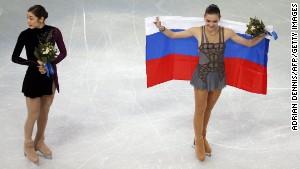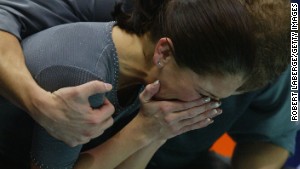Editor's note: Amy Bass, a professor of history at the College of New Rochelle, has written widely on the cultural history of sports, including the book "Not the Triumph but the Struggle: The 1968 Olympics and the Making of the Black Athlete." She is a veteran of eight Olympics as the supervisor of NBC's Research Room, for which she won an Emmy in 2012. Follow her on Twitter @bassab1.
(CNN) -- Oh, figure skating. Not again. Didn't anyone tell you? The Cold War is over. You are supposed to be reformed.
At the Winter Olympics in Sochi, Russia, on Thursday, South Korea's Yuna Kim, a 2010 Olympic gold medalist, skated an ethereally beautiful and outwardly perfect long program in the ladies free skating competition. She then lost gold to Russia's Adelina Sotnikova. Few saw that coming.
 Amy Bass
Amy Bass On paper, Sotnikova had one more triple jump than Kim, including the triple loop, which Kim does not do. Although Sotnikova had an awkward moment on her own double loop, her spins were faster, her jumps higher, and unlike Kim, who looked exhausted at the end of her gorgeous skate, Sotnikova flew across the ice with great speed and then looked like she could do it all again.
It should have been a great moment in Olympic sports: champion dethroned by a rising star, an upset, a shocker. Instead, it was controversial water cooler fodder the next day because the results raised so many questions: Did the youngster, a bit rough around the edges, deserve such high marks? Was she really better in just about every element, including her components mark, which was an astonishing 4.81 points higher than at the European championships last month?
Setting aside her extreme margin of victory, there are reasons to think the judges got the podium right. Three-time world champion Elvis Stojko, for example, who had always accentuated an aggressive style over artistry, praised the marks, pleased that the judges rewarded Sotnikova's athleticism and degrees of difficulty over Kim's elegance. Figure skating is, after all, a sport.
But if it wants to be treated like one, it has to act like one.
There is a long history of controversy and scandal that continues to hang over the International Skating Federation, particularly as Russia's first individual female gold medalist (and on home ice, no less) brings familiar echoes of the Cold War. And during the team competition, there were murmurs, to be sure, over Evgeni Plushenko's high marks. It appeared to some that the judges bolstered his score based on his dynamic presence and the sentimental drama of the legendary champion's return to the ice to lead the home team to gold, rather than the difficulty of his program and his execution of it.
Further, the sport had changed its scoring system to avoid this very situation. After the controversy that went down in Salt Lake in 2002 over the pairs competition, in which French judge Marie-Reine Le Gougne tearfully confessed she had voted for the Russian pair in order to gain an advantage for the French ice dancers, the ISU revamped its scoring system. Gone were the days of the perfect six.
 Surprising skating win spurs controversy
Surprising skating win spurs controversy  2002: Infamous Olympics scoring scandal
2002: Infamous Olympics scoring scandal With the new system, too, judges are now anonymous, in hopes of relieving the sport of its former biases. Back in 1994, for example, when Oksana Baiul took gold over Nancy Kerrigan, the scores broke down along familiar lines: Judges from Ukraine, China, eastern Germany, Poland and the Czech Republic went for Baiul. Canada, Japan, the United States and Great Britain put Kerrigan first. Although she skated cleanly, Kerrigan had doubled a triple jump; Baiul, considered the superior artist, did a two-footed landing, and performed no triple-triple combination.
Four years later, while an East-West split wasn't apparent in the battle between Tara Lipinski's triple loop-triple loop combination and Michelle Kwan's ability to make judges weep, it remained unclear who favored technique and who performed artistry.
While few can say they actually comprehend today's scoring system, it was designed to yield more balanced results supported by more intricate math. But the ISU needs to back these efforts with ethical and responsible judges.
For the ladies free program, the panel included Russian Alla Shekhovtseva, who is married to the general director of the Russian skating federation, and Ukrainian Yuri Balkov, who had been suspended for attempting to fix the ice dancing competition in Nagano in 1998. And this after rumors had dogged the ice dancing competition, with accusations that the Russians and the Americans (maybe the Cold War is over!) had colluded to shut out Canada.
There is likely little truth to the ice dancing gossip, but the ISU has done nothing to make us think otherwise. If the governing body wants us to talk about figure skating as a sport, it needs to ensure that it behaves like one, with credibility and transparency. Because while the ladies podium may have been right, with scoring this complex and judges this questionable, why on earth would we believe it?
Follow us on Twitter @CNNOpinion.
Join us on Facebook/CNNOpinion.
{ 0 comments... read them below or add one }
Post a Comment